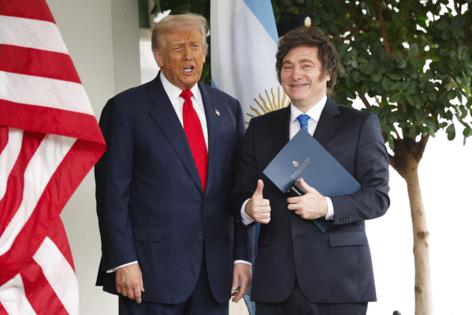Trump says 'we're gone' If Milei doesn't prevail in midterms
Published in News & Features
President Donald Trump suggested the $20 billion lifeline the U.S. has provided Buenos Aires could be contingent on Argentine President Javier Milei’s success in the midterm elections as the pair met at the White House on Tuesday.
“If he wins we’re staying with him, and if he doesn’t win we’re gone,” Trump told reporters, adding that the pair also planned to discuss a potential free trade agreement.
While Trump at other points batted away suggestions that U.S. assistance was intended to boost Milei politically, he also repeatedly emphasized that the $20 billion currency swap — meant to help shore up Argentina’s peso and calm financial markets in the South American nation — was intended as a signal of support for the Argentine leader’s economic philosophy.
“We want to help Argentina,” Trump said Tuesday, touting trade as a way to help bolster the country. “One of the ways we can do, they have great product, and we used to do a lot of trade.”
The White House meeting came less than two weeks before a pivotal Oct. 26 midterm election set to decide the future of Milei’s presidency and his reform efforts. Milei, a libertarian, has brandished a chainsaw to champion cuts in government spending and a series of austerity measures that proved unpopular with voters, helping drive higher disapproval ratings.
Argentina’s dollar bonds are dropping across the curve, reversing earlier gains, after Trump’s remarks. The country’s dollar notes maturing in 2035 fell by almost 3 cents on the dollar, to trade around 57 cents, after Trump’s comments.
Trump was also asked about China’s purchase of soybeans from Argentina and plans to charge port fees for U.S. ships, but brushed the questions aside.
“I guess it’s natural, it’s China, and it’s natural,” Trump said. “It’s not going to mean anything in the end.”
The president did suggest he would be unhappy if Argentina was otherwise deepening its ties with Beijing.
“Can do some trade, but you certainly shouldn’t be doing beyond that,” Trump said. “Certainly shouldn’t be doing anything having to do with the military with China.”
Treasury Secretary Scott Bessent interjected to say that the U.S. assistance was not predicated on ending its China swap.
“Any reporting to that effect is incorrect,” he said. “This aid is predicated on robust policies, and going back to the failed Peronist policies, would cause a U.S. rethink,” he added.
Asked what comments about Argentina minimizing Chinese influence referred to, Bessent responded: “I was referring more to ports, military bases, observation facilities that have been created in Argentina.”
Trump was also asked if Milei should dollarize Argentina’s economy, as he pledged to do during his 2023 campaign. Trump deferred the question to Bessent, who said the U.S. was “very happy with the current currency arrangement.”
The U.S. Treasury has directly purchased pesos in a move following unsuccessful efforts by Argentine authorities to stem the currency’s slide. The U.S. is willing to continue purchasing pesos and bonds, Argentina’s Economy Minister Luis Caputo said Sunday in an interview with Buenos Aires-based TV channel LN+.
‘Some pain’
Trump broadly offered support for Milei’s economic approach, saying his counterpart was “really on the verge of tremendous economic success.”
“It’s a very big election being watched by the world because he’s done an incredible job. But with that comes some pain, and they have some pain, and now they’re coming out of it. I think the victory is very important,” Trump said.
The U.S. lifeline, announced by Bessent last week, represents an extraordinary U.S. intervention into foreign financial markets — one that critics have said conflicts with Trump’s “America First” agenda and imperils taxpayer dollars. Some Democrats have called the arrangement politically motivated, aimed at shoring up a leader seen as an ideological ally of Trump’s, and have questioned the influence of potential beneficiaries, including hedge funds and asset managers suspected of lobbying for the deal.
U.S. farming interests also have taken affront, since the currency swap follows Argentina’s sale of millions of tons of soybeans to China — which has paused purchases of the U.S. commodity amid trade tensions.
Nevertheless, supporters have cast the currency swap as a bid to buy time for Argentina’s stabilization and Milei’s reforms. Bessent also has defended the deal, describing a strong, stable Argentina as in the U.S. strategic interest.
--------
—With assistance from Patrick Gillespie and Jordan Fabian.
©2025 Bloomberg L.P. Visit bloomberg.com. Distributed by Tribune Content Agency, LLC.







Comments